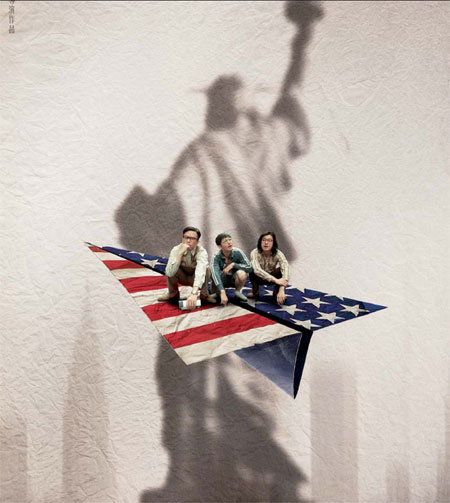Chasing their dreams
Updated: 2013-10-18 09:45
By Terence Hsieh (China Daily Europe)
|
|||||||||||
An inspirational movie takes a one-sided view of the pursuit of business success
If Aaron Sorkin had written Chinese movies glamorizing the rise and fall of entrepreneurs in the 1990s, then American Dreams in China
(《中国合伙人》 zhōngguó héhuǒrén) surely would have been the jewel in his crown. In just 10 days, Dreams became the largest current-grossing blockbuster in China, generating nearly $51 million - leading to its surreptitiously mentioned subtitle: "The Chinese Social Network".
Alas, Sorkin had no role in the creation of Dreams; instead, Hong Kong director Peter Chan pays just a little more than a comfortable homage to Sorkin's Zuckerberg biopic.
Dreams is loosely based around the back story of the founders of New Orient Education and Technology Group, an English-language firm that IPO'd in the United States in 2006. New Orient is retitled New Dream, and the three protagonists - Meng Xiaojun, Cheng Dongqing and Wang Yang - are respectively played by veteran actors Deng Chao, Huang Xiaoming and Tong Dawei.
Dreams then becomes a story about what young Chinese men are willing to do to achieve success and the lechery, hardship and seduction that comes with it.
All three men meet as young, enterprising college students in the 1990s, with the same dreams as their peers: getting to the US. Their college-boy antics, forcible fondles, back room hookups, nervous glances at beautiful girls, etc, begin to lead them inexorably toward their greater purpose of a life in America.
The format of the movie flits to and from scenes of a private office, where they are being accused of intellectual thievery, to the happy-go-lucky days of their youth and the stories that shaped their development into the forlorn and wise characters who sit at the glass table.
But what's interesting, or surprising, in this movie isn't the smarmy dialogue (Sorkin's pointy one-liners have been converted to truth-y lectures on success and life). It isn't even the relationships between these three up-and-coming young Chinese men that lead them to betray, support and reject each other. What Dreams does well is dramatizing and portraying the ethos of China's youth in the 90s - an evocation of the optimism, knavery and seduction that surrounded their struggle to reach America.
Times Square gleams like a modern Zion and each protagonist looks longingly to the sky each time the word "America" is mentioned. Back in a college book club led by Meng, he asks his peers to describe their generation using a single word. In the end, he offers his own view:
The most important mission of our generation is to change. Change everyone and everything around us. The only constant is our courage at this moment. If we can do it, we will change the whole world.
Wǒmen zhè yīdài rén, zuì zhòngyào de shì gǎibiàn. Gǎibiàn shēnbiān měi gè rén, gǎibiàn shēnbiān měi jiàn shì. Wéiyī bùbiàn de jiù shì cǐshí cǐkè de yǒngqì. Rúguǒ wǒmen néng zuò dào zhè yīdiǎn, wǒmen jiāng gǎibiàn shìjiè.
我们这一代人,最重要的是改变。改变身边每个人,改变身边每件事。唯一不变的就此时此刻的勇气。如果我们能做到这一点,我们将改变世界。
Meng also believes:
There is only one place you can really change the world, America.
Zhǐyǒu zài yīgè dìfāng cáinéng zhēnzhèng dì gǎibiàn shìjiè, měiguó.
只有在一个地方才能真正地改变 世界,美国。
Dreams is the culmination of what every 40-something in China wished they could have achieved, in a simpler age, a dream of success and a better life. Every speech on success and the meaning of life delivered is a reflection on the youthful optimism of a generation, a time before cynicism and pessimism, when the metaphorical grass was greener and the pastures wider. Cheng, especially, develops his own philosophy on success. In an English class, he speaks to a group of students about his failed attempt at getting a US visa:
We have to seek victory in defeat, and find hope in despair.
Wǒmen zhǐyǒu zài shībài zhōng xúnzhǎo shènglì, zài juéwàng zhōng xúnqiú xīwàng.
我们只有在失败中寻找胜利,在绝望中寻求希望。
When New Dream English School turns out to be a success, Cheng speaks to a stadium packed with students who wish to study abroad:
What is a dream? It's the thing that allows you to draw happiness from persistence.
Mèngxiǎng shì shénme? Mèngxiǎng jiùshì yī zhǒng ràng nǐ gǎndào jiānchí jiùshì xìngfú de dōngxi.
梦想是什么?梦想就是一种让你感到坚持就是幸福的东西。
Finally, in response to a journalist's question on the secret of his success, he explains:
When you realize failure is only a detour, you are already on the way to success.
Dāng nǐ yìshí dào shībài zhǐshì wānlù, nǐ jiù yǐjīng zǒu zài le chénggōng de zhídào shàng.
当你意识到失败只是弯路,你就已经走在了成功的直道上。
This desperate hope for a better life is, ultimately, Chan's justification for a relaxed moral compass over controversial issues like copyright infringement. The film begins amidst legal proceedings, during which the three founders are accused of stealing intellectual property.
"You are thieves," the US lawyer at the table snarls.
"I memorized the entire Xinhua Dictionary and I was considered a mediocre student," Cheng glares down at his American counterpart.
"Chinese students are extremely adept at taking exams; you can't imagine what they're willing to go through to succeed."
Meng, who receives a student visa to go to the US, is cheated, beaten and bullied by his American counterparts, who are portrayed as cold and willing to pull the rug out from under his feet. Meng's American Dream is destroyed, not by his lack of talent, but because some Americans are emotionless and unkind people who fail to take care of their pitiful guest.
All of America is out to get him: customs agents search him, cab drivers curse him; even secretaries won't give him an appointment. "They don't respect us," Meng said. "That's why I'm out for myself and myself only."
Chan's co-opted Chinese vision of America effectively sets up the biggest straw man of the movie. It's an aesthetic that not only victimizes young, "aspiring" Chinese entrepreneurs, but fetishizes them as national heroes. In a scene when Cheng and Wang are enjoying their newly gained success by drinking and singing in a KTV bar, a conversation ensues:
Wang: What do you do if life deceives you?
Jiǎrú shēnghuó qīpiànle nǐ, nǐ huì zěnmebàn?
假如生活欺骗了你,你会怎么办?
Cheng: You are drunk.
Nǐ hē duō le.
你喝多了。
Wang: You deceive life back!
Nǐ yě yào qīpiàn huí shēnghuó!
你也要欺骗回生活!
Meng, Cheng and Wang speak to stadiums to tumultuous applause and lecture to enraptured audiences. The hubristic finger-shaking and Art of War-like speeches encapsulate the message that Chinese people are tired of being trampled upon. Cheng tells his two comrades during their lunch break:
Eat up. We're going to storm America by force.
Chī wán fàn, zánmen qù gōngxiàn měiguó.
吃完饭,咱们去攻陷美国。
Peter Chan is one of Hong Kong's most revered directors and thus it is surprising how much he panders to this dog-eat-dog aesthetic, one that fully asserts that "China is here to stay; deal with it!" The message is, not surprisingly, very popular with Chinese audiences.
Courtesy of The World of Chinese,
www.theworldofchinese.com
The World of Chinese
|
American Dreams in China portrays the ethos of China's youth in the 1990s. Provided to China Daily |
(China Daily European Weekly 10/18/2013 page27)
Today's Top News
Scientists requested government to plant GM crops
Travelers to Europe bypass attractions of Brussels
Li urges greater effort on reforms
'Constructive ideas' on thorny issues needed
US deal key to nabbing fugitives
JPMorgan, DOJ reaches $13b deal
As China's economy grows, so does reform call
Expanded property tax trials predicted
Hot Topics
Lunar probe , China growth forecasts, Emission rules get tougher, China seen through 'colored lens', International board,
Editor's Picks

|

|

|

|

|

|






